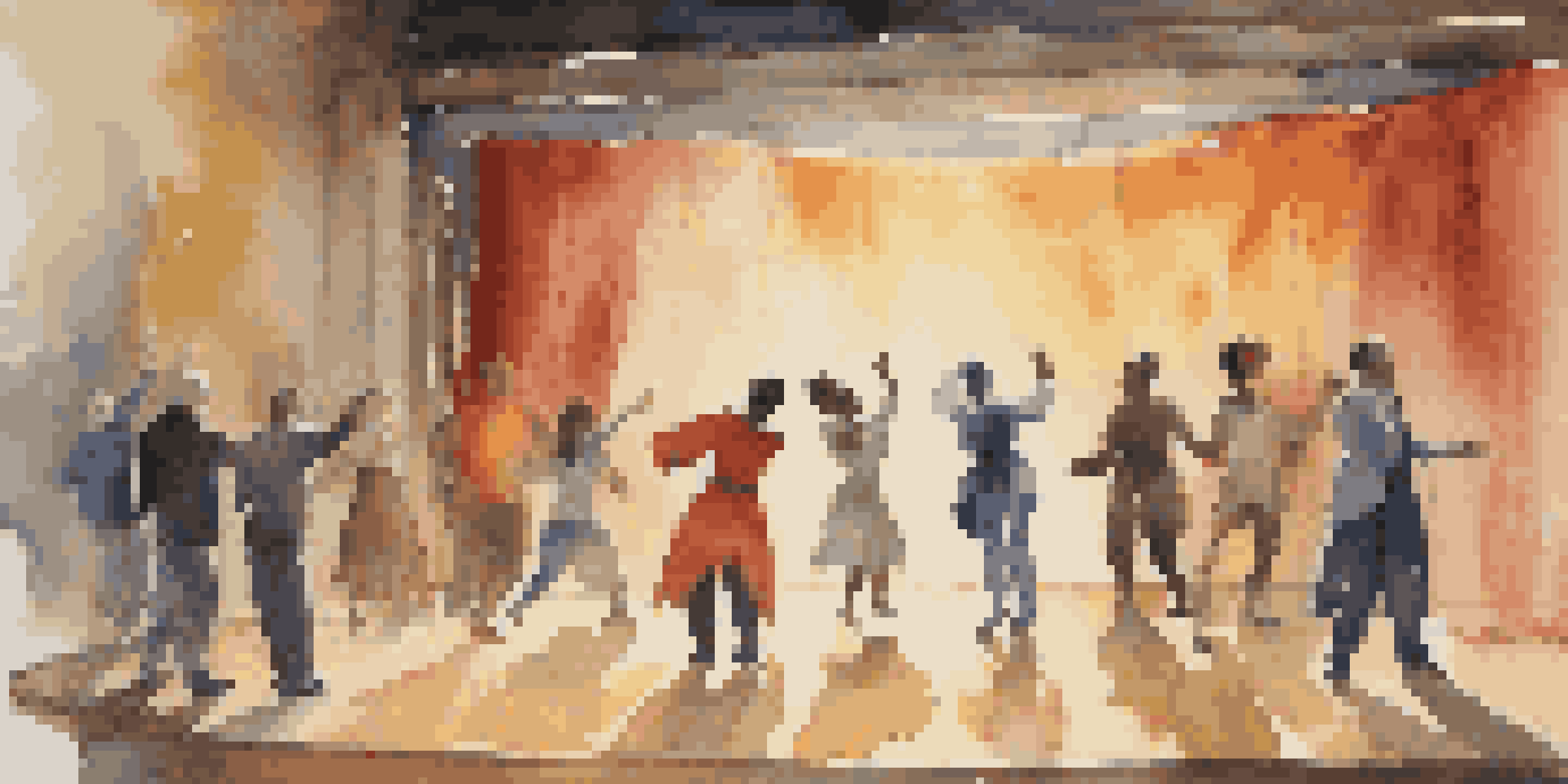The Importance of Rehearsal in Bringing Your Script to Life

Understanding the Purpose of Rehearsal in Theater
Rehearsal is the critical bridge between script and performance. It allows actors to embody their characters fully and understand the nuances of their roles. During this time, they explore the motivations, emotions, and relationships that breathe life into the written word.
The only way to do great work is to love what you do.
Think of rehearsal like a dress rehearsal for a big event. It's not just about memorizing lines; it's about finding the heart of the story. Actors can experiment with delivery, timing, and even physicality, ensuring that every moment is polished before the audience arrives.
Ultimately, rehearsal transforms a collection of words on a page into a dynamic, believable performance. Without it, even the best-written scripts can fall flat, as there's no opportunity for exploration and refinement.
Building Chemistry Among Cast Members
One of the most rewarding aspects of rehearsal is the opportunity for cast members to bond. This chemistry is essential for creating authentic interactions on stage. Just like in real life, the connections between characters are enhanced when actors invest time together.

Imagine a sports team practicing together before a big game. The more they train, the more they learn to anticipate each other's moves. In theater, this same principle applies; rehearsals foster understanding and trust among actors, which translates directly to their performances.
Rehearsal Enhances Character Depth
Through rehearsal, actors explore their characters' motivations and layers, leading to more relatable and compelling performances.
When cast members know each other well, they can respond more naturally to one another during performances. This creates a compelling dynamic that captivates the audience and elevates the overall production.
Fine-Tuning Character Development Through Rehearsal
Every character has layers, and it’s through rehearsal that these layers are peeled back. Actors have the chance to delve deep into their characters, discovering motivations and backstories that can sometimes be overlooked. This exploration is vital for creating multidimensional characters.
Rehearsal is an opportunity to prepare, to adjust, and to discover the magic that happens in the moment.
Consider the difference between a flat character and a fully realized one. A fully developed character feels relatable and real, drawing audiences into the narrative. Rehearsal allows actors to ask questions and seek guidance, leading to richer, more compelling portrayals.
By the end of the rehearsal process, actors often find that their understanding of their characters has evolved significantly. This depth enhances both their performances and the audience's experience, turning a script into a captivating story.
Mastering Timing and Pacing in Performance
Timing and pacing are crucial elements of any performance, and rehearsal is where these elements are honed. Actors learn how to deliver lines for maximum impact, balancing humor and drama seamlessly. This is especially important in comedic scenes, where timing can make or break a punchline.
Think of a well-timed joke as a musical rhythm. Just as musicians practice to achieve perfect timing, actors must rehearse to synchronize their delivery with the overall flow of the performance. This can turn a good performance into a memorable one.
Chemistry Boosts Performance Quality
The bonding among cast members during rehearsals creates a natural chemistry that enhances interactions and captivates the audience.
Through repetition and refinement during rehearsals, actors can find the perfect rhythm for their interactions. This mastery of timing not only enhances the performance but also keeps the audience engaged from start to finish.
Creating a Cohesive Vision for the Production
Rehearsals are not just about the actors; they involve the entire production team, including directors, stage managers, and designers. This collaborative effort is essential for creating a cohesive vision for the show. It allows everyone to align their artistic interpretations and ensure that all elements work harmoniously.
Imagine a symphony orchestra where each musician plays their part without listening to the others. The result would be chaotic! In theater, rehearsals provide the structure needed for all creative voices to be heard and integrated into the final performance.
A unified vision leads to a more polished production, where lighting, sound, and set design all complement the actors' performances. The synergy created in rehearsal ultimately results in a captivating and immersive experience for the audience.
Addressing Challenges and Making Adjustments
Rehearsals are the perfect time to address any challenges that arise during the rehearsal process. Whether it's a scene that feels off or a technical issue, this is where solutions can be found. It's all about trial and error, which is crucial for refining the overall performance.
Think of rehearsals as a workshop where mistakes are not only accepted but encouraged. Each misstep is an opportunity to learn and improve. Actors can experiment with different approaches, while directors can provide feedback and adjustments.
Rehearsals Build Confidence and Skills
Rehearsals provide a safe space for actors to refine their craft, address challenges, and gain confidence in their roles before performances.
This process of adaptation is vital for overcoming obstacles, ensuring that when the curtain rises, the production is as smooth as possible. Being proactive during rehearsals helps to build confidence, leading to a successful performance on opening night.
The Emotional and Psychological Benefits of Rehearsal
Beyond the technical aspects, rehearsals offer significant emotional and psychological benefits for actors. They provide a safe space to explore vulnerability and express feelings, which can be cathartic for performers. This emotional investment not only enhances individual performances but also contributes to a richer ensemble.
Consider how athletes often talk about the mental preparation required for competition. Similarly, rehearsals help actors build confidence and reduce anxiety about performing. The more they practice, the more comfortable they become in their roles and with their fellow cast members.

This emotional readiness can be a game changer on stage. When actors feel secure and connected, they are free to take risks and fully inhabit their characters, creating an unforgettable experience for the audience.
The Lasting Impact of Rehearsal on Performance Quality
The culmination of all these rehearsal elements is a significant enhancement in performance quality. When actors are well-rehearsed, they bring a level of professionalism and polish that is palpable. This not only impresses audiences but also leaves a lasting impression that can lead to repeat viewings.
Just as a well-prepared chef serves a delicious meal, a well-rehearsed cast delivers a performance that resonates. The attention to detail, emotional depth, and cohesive storytelling all contribute to a memorable experience.
In the world of theater, the power of rehearsal cannot be overstated. It's the secret ingredient that transforms scripts into captivating performances, making it an essential part of the artistic process.